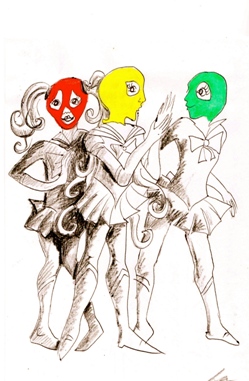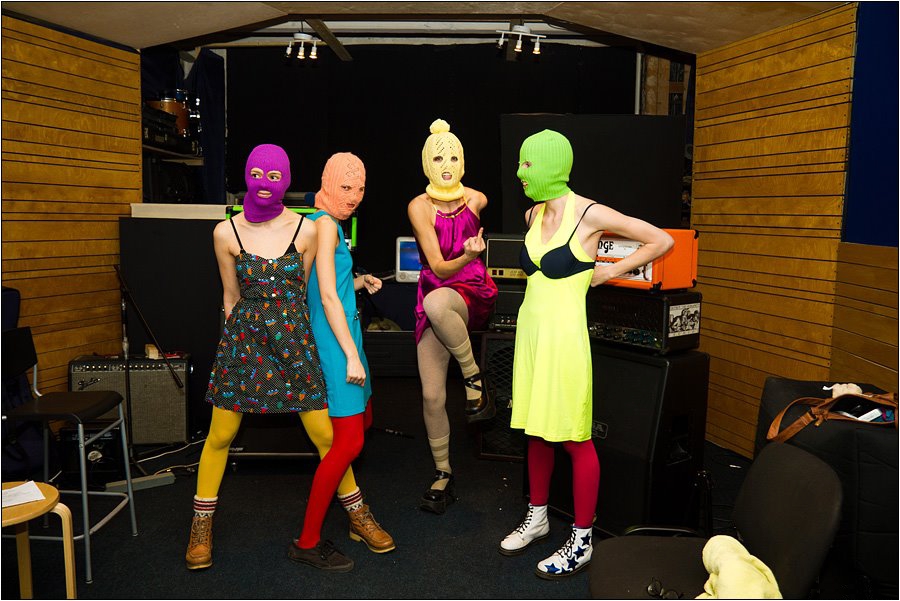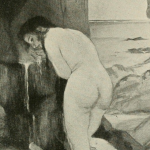They sang, they rocked and they got arrested. But because of their fearless action, the whole of Europe and the world has been inspired. Nominated for the European Parliament’s Sakharov prize, Pussy Riot have become real rock stars to many.
Pussy what?
I still remember the first time I heard the name “Pussyriot” on the news; I thought it was a joke. How can anyone not chuckle (even a little bit) when they hear the name? I remember freezing for a while to let the name sink in and didn’t quite hear what the reporter was saying about the revolutionary start of a movement that was happened in February this year, in the Cathedral of Christ the Saviour in Moscow.

Five girls from a Russian punk rock band staged an unauthorised and unprecedented performance in the Orthodox church and made a music video out of it. Okay, granted that anyone would be held back if when s/he saw five (or so) girls with masks kicking their legs up high in a church, and playing air guitars while shaking their heads like some rock God. But the biggest problem is that this particular music video, titled “Punk prayer – Mother of God, Chase Putin Away” went viral before the re-election of Vladimir Putin.
In the “prayer”, Pussy Riot asked the Virgin Mary to get rid of Vladimir Putin and to become a feminist herself. As a result, someone (not the Virgin Mary) obviously felt really offended and decided to hunt them down and lock them up. Three of the members of the band, Maria Alyokhina, Nadezhda Tolokonnikova and Yekaterina Samutsevich, were arrested and charged with hooliganism. They have been accused of disrespecting the Orthodox church and sentenced to two years in a labour camp. The other two members who also performed that day but did not get arrested have fled the country.
Half a year after the video went viral, it seems like everyone’s heard of Pussy Riot, and everyone remebers their iconic balaclavas and their brightly-coloured tights. But more importantly, these almost-nameless individuals have made the world hear the anger of the young generation of Russia and the ridicule of the government that claims to be a partner of Europe: the band was put in jail even after the Orthodox church announced that they had forgiven them. It means that if the Church, which was used to justify the charges, said they did not want to press charges, what can be a better explanation than revenge by Putin?
It’s not about the music
You may argue that what they have done is nothing extraordinary; there have been greater Russian freedom fighters before them and there will be greater ones after them. You are absolutely correct. But what I admire about these pussy rioters is that they have created a wave of inspiration. Throughout the world, there have been continuous protests in support of their movement and more attention has been brought to the situation in Russia. More and more young Europeans have turned their heads to this country and tried to understand what all of this is about. Despite all the political politeness and the age of European verbal condemnation that does nothing, young Europeans go on the streets in support of freedom of speech in a country that they seldom dream of protesting for.
Pussy Riot, both on stage and off, have shown courage and creativity to speak up in a world of pretence and political compromise. They are not girls who have nothing to lose and nothing better to do than to bathe themselves in this limelight. Some of them are mothers and I believe if mothers can sacrifice their comfortable lives with their children in exchange for changes in a country, they must love this country immensely.
Pussy riot have believed themselves capable of showing their true colours. In exchange, the screaming and leg-kicking of these rebels has shaken the world and brought the message throughout Europe and across the Atlantic with their less-than-outstanding music. Many years later, we will still look back and see them as a symbol of female determination, an icon to fight against oppression and an inspiration to more political movement among youth in Europe.
Cover illustration: Laura Hempel









